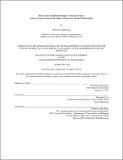How to drive Thailand Developers Toward Net Zero: Lessons Learned from the Developer's Perspective and the Global Studies
Author(s)
Lertpunyaroj, Ravisara
DownloadThesis PDF (797.9Kb)
Advisor
Tan, Zhengzhen
Terms of use
Metadata
Show full item recordAbstract
In recent years, there has been a growing concern regarding climate change risks to real estate in developed and developing countries. Climate change refers to long-term shifts in temperatures and weather patterns. Since the 1800s, human activities have been the key driver of climate change due to burning fossil fuels such as coal, oil, and gas, which generate greenhouse gas emissions that trap the sun's heat and raise temperatures. Climate change disrupts national economies and affects lives globally. Thailand is one of the most vulnerable countries in the world that has been affected by changes in weather patterns and natural disasters. It was ranked as one of the ten most flood-affected countries in the world. The extreme weather could impact 2 million lives by 2035- 2044 (Tan & Zheng, 2022). Keeping global warming below 1.5 °C is a challenging task. The Paris Agreement aims at achieving net zero carbon dioxide (CO2) emissions in the second half of this century, and Thailand is one of many countries that have committed to this goal. At the press conference, Prime Minister Prayut Chan-ocha announced that the country is committed to net zero emissions by 2065. However, net zero development in Thailand is new, and there is not much information about net zero practice in the region. There is no study about the adoption of net zero in the real estate sector. This qualitative study analyzes the reasons developers adopt net zero and how the public sector can help developers achieve net zero goals based on developers' perspectives. The rationale for conducting this research is to bring Thai voices into the global real estate sector's net zero transition conversation. From the research, I found that competitive advantage, branding and marketing, and lower green technology costs are the key elements that influence Thai real estate developers to adopt the net zero practice. However, the developers need support from the government, including technological advancement, government incentives, and guidelines. The finding and discussion can help the developers adopt necessary responses to reduce negative impacts, and the policymakers can learn from the recommendations for the appropriate policies for the real estate sector.
Keywords: net zero; real estate development; developer; decarbonization; pathway to reduce greenhouse gas; Thailand; commercial; residential
Date issued
2023-02Department
Massachusetts Institute of Technology. Center for Real Estate. Program in Real Estate Development.Publisher
Massachusetts Institute of Technology